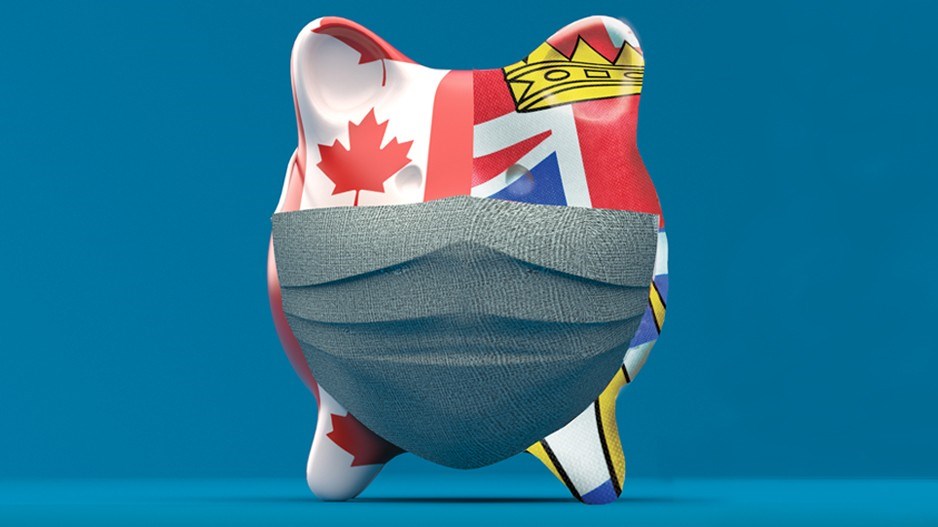The federal government will need to hike taxes or impose new ones to start whittling down a deficit that has metastasized during the pandemic, but business groups and economic think-tanks say now is not the time for either, given that the Canadian economy is still in recovery.
Ottawa is also unlikely to impose new or higher taxes if Prime Minister Justin Trudeau is planning a snap election.
Few observers expect to see any major tax hikes or new taxes in either the federal budget, which comes down April 19, or the B.C. provincial budget, which comes down the day after.
“It would be a very bad idea for any government to start raising taxes now,” said Alexandre Laurin, director of research for C.D. Howe Institute. “And I haven’t seen anyone recommending this right away.”
Ken Peacock, chief economist for the Business Council of BC (BCBC), agrees.
“I don’t think the provincial government will hike taxes either. It feels much more like a holding pattern.”
But Werner Antweiler, associate professor at the University of British Columbia’s Sauder School of Business, said there is one new tax measure that he wouldn’t be surprised to see in the federal budget: removal of the exemption on capital gains on home sales.
“It’s a smart policy to apply to an overheated housing market,” Antweiler said. “It’s really not about revenue.”
As the Canadian economy begins to recover from a pandemic-induced recession, governments will need to execute a high-wire balancing act in their budgets by providing Canadians and businesses with the supports they still need, stimulus spending to promote job growth and investment and a plan to eventually rein in runaway deficits, but without badly timed tax hikes that could curb business growth.
While high taxes can curb economic growth, so can unsustainable debt, says the C.D. Howe.
“Debt also has an economic cost,” Laurin said. “Too much government debt can crowd out other investments.”
The federal deficit, which had been projected to be $17 billion in 2020-21, has ballooned to $420 billion, according to a C.D. Howe shadow budget. To get a grip on debt and deficits, the institute recommends a 2% hike to the GST in 2023.
As for B.C., the provincial government deficit for 2020 was last estimated at $13 billion, about $8 billion of which was spending related to the pandemic.
“My assumption is it will be another year of deficit,” Liberal finance critic Mike Bernier said of the 2021-22 provincial budget scheduled to unveiled on April 20.
The B.C. government already implemented a suite of tax hikes at the beginning of April, all of which had been planned for 2020, but which were deferred for one year, due to the pandemic.
On April 1, the carbon tax was hiked by $5 per tonne, the PST was applied to sweetened beverages and a new “Netflix tax” – a tax on music, TV and movie streaming – went into effect.
“We’re becoming one of the highest-taxed jurisdictions in Canada,” Bernier lamented March 25 during a debate on a $12.3 billion appropriation bill. “You look at our small business tax rate, the NDP increased that. At the same time, Alberta lowered theirs drastically. Plus our carbon tax has gone up compared to every other province.”
Provincially, business groups like the Greater Vancouver Board of Trade (GVBOT) hope John Horgan’s government takes a “do no harm” approach in its provincial budget.
Governments may be tempted to “tax the rich” by raising the marginal income tax rate for high-income earners. In B.C. that’s 54% on annual income of $220,000 or more.
Given that Canada has the seventh highest marginal tax rate among the 36 Organization for Economic Co-operation and Development nations, GVBOT president Bridgitte Anderson hopes governments don’t increase it.
“For us it really is imperative that tax policy not only supports and encourages economic activity and growth, but that it also thinks about long-term competitiveness,” Anderson said.
Peacock pointed to professional services and technology as two high-growth areas that could suffer from higher taxes.
“There really is strong expansion in those sectors, and [high income taxes] discourage people. High- skilled people are mobile, and they can go to other jurisdictions, and when tax rates get well above 50%, which they already are, that does have the effect of discouraging skilled people.”
In terms of B.C.’s comparative competitive position, Peacock added that B.C.’s carbon tax is becoming a big concern for business.
Although the rest of Canada will soon pay the same carbon prices as British Columbians do, they don’t get the same breaks. The federal carbon tax is said to be revenue neutral or close to neutral. B.C.’s carbon tax was initially revenue neutral, but no longer is.
Some British Columbians get a rebate, based on income levels, but those rebates are smaller than the federal rebates Canadians in some other provinces get. Moreover, the federal output-based pricing system provides some protection for energy intensive industries against competition from companies outside of Canada that don’t pay carbon taxes.
Peacock said a similar mechanism is largely missing in B.C.
Nationally, if Trudeau wants to improve Canada’s competitive position with the respect to the U.S., he can just stand back and let President Joe Biden do the heavy lifting.
Biden plans to undo Donald Trump’s corporate tax cut, restoring the rate to 28%, from Trump’s 21%. That would put U.S. businesses back on an even footing with Canadian businesses, which pay a combined federal-provincial rate of 27%.
“If Canada can resist the temptation to increase taxes at this point,” Peacock said, “undoing those Trump tax cuts absolutely will level the playing field and potentially give Canada a little bit of an advantage.” •




